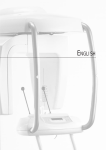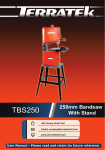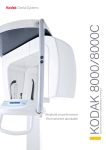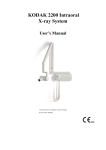Download KODAK 8000C Digital Panoramic and
Transcript
KODAK 8000C Digital Panoramic and Cephalometric Extraoral Imaging System Installation Guide Notice Congratulations on your purchase of the KODAK 8000C Digital Panoramic and Cephalometric Extraoral Imaging System. Thank you for your confidence in our products and we will do all in our power to ensure your complete satisfaction. The Installation Guide for the KODAK 8000C Digital Panoramic and Cephalometric Extraoral Imaging System includes information on the cephalometric features. For the panoramic features, see the KODAK 8000 Extraoral Imaging System (SM721) Installation Guide. We recommend that you thoroughly familiarize yourself with this Guide in order to make the most effective use of your system. WARNING: We recommend that you consult the “Safety, Regulatory and the Technical Specification User Guide” before using the KODAK 8000C Extraoral Imaging Systems. The information contained in this Guide may be subject to modification without notice, justification or notification to the persons concerned. No part of this Guide may be reproduced without the express permission of Carestream Health, Inc. The US Federal law restricts this device to sale by or on the order of a physician. This document is originally written in English. Manual Name: KODAK 8000C Digital Panoramic and Cephalometric Extraoral Imaging System Installation Guide Part Number: SM736 Revision Number: 02 Print Date: 03/2010 The brand names and logos reproduced in this Guide are copyright. KODAK is a trademark of KODAK used under License. KODAK 8000C Digital Panoramic and Cephalometric Extraoral Imaging System, complies with Directive 93/42/CEE relating to medical equipment. . 0086 Manufacturer Carestream Hea lth, Inc. 150 Verona Street Rochester NY 14 608 Authorized Representative in the European Community EC REP TROPHY 4, Rue F. Pelloutier, Croissy-Beaubourg 77435 Marne la Vallée Cedex 2, France Contents 1—About This Guide Conventions in this Guide. . . . . . . . . . . . . . . . . . . . . . . . . . . . . . . . . . . . . . . . . . . . . . . . . . . . . . . . . . . . . . . . . . . . . 1–1 2—KODAK 8000C UNIT OVERVIEW General Overview . . . . . . . . . . . . . . . . . . . . . . . . . . . . . . . . . . . . . . . . . . . . . . . . . . . . . . . . . . . . . . . . . . . . . . . . . . . Mobile Components . . . . . . . . . . . . . . . . . . . . . . . . . . . . . . . . . . . . . . . . . . . . . . . . . . . . . . . . . . . . . . . . . . . . . . General Functional Components . . . . . . . . . . . . . . . . . . . . . . . . . . . . . . . . . . . . . . . . . . . . . . . . . . . . . . . . . . . . Digital Sensor Locations. . . . . . . . . . . . . . . . . . . . . . . . . . . . . . . . . . . . . . . . . . . . . . . . . . . . . . . . . . . . . . . . . . . Laser Locations . . . . . . . . . . . . . . . . . . . . . . . . . . . . . . . . . . . . . . . . . . . . . . . . . . . . . . . . . . . . . . . . . . . . . . . . . . Control Panel . . . . . . . . . . . . . . . . . . . . . . . . . . . . . . . . . . . . . . . . . . . . . . . . . . . . . . . . . . . . . . . . . . . . . . . . . . . . . . . X-Ray Remote Control Overview . . . . . . . . . . . . . . . . . . . . . . . . . . . . . . . . . . . . . . . . . . . . . . . . . . . . . . . . . . . . . . . Positioning Accessories and Replacement Parts . . . . . . . . . . . . . . . . . . . . . . . . . . . . . . . . . . . . . . . . . . . . . . . . . . 2–1 2–2 2–3 2–5 2–6 2–7 2–8 2–9 3—KODAK 8000C PACKAGING Standard Packaging . . . . . . . . . . . . . . . . . . . . . . . . . . . . . . . . . . . . . . . . . . . . . . . . . . . . . . . . . . . . . . . . . . . . . . . . . 3–1 4—SITE PREPARATION BEFORE INSTALLATION Standard Compliance . . . . . . . . . . . . . . . . . . . . . . . . . . . . . . . . . . . . . . . . . . . . . . . . . . . . . . . . . . . . . . . . . . . . . . . . Environmental Requirements . . . . . . . . . . . . . . . . . . . . . . . . . . . . . . . . . . . . . . . . . . . . . . . . . . . . . . . . . . . . . . . . . . Unit Dimensions . . . . . . . . . . . . . . . . . . . . . . . . . . . . . . . . . . . . . . . . . . . . . . . . . . . . . . . . . . . . . . . . . . . . . . . . . . . . . Electrical Requirements. . . . . . . . . . . . . . . . . . . . . . . . . . . . . . . . . . . . . . . . . . . . . . . . . . . . . . . . . . . . . . . . . . . . . . . X-Ray Room Requirement . . . . . . . . . . . . . . . . . . . . . . . . . . . . . . . . . . . . . . . . . . . . . . . . . . . . . . . . . . . . . . . . . . . . . Computer System Requirements . . . . . . . . . . . . . . . . . . . . . . . . . . . . . . . . . . . . . . . . . . . . . . . . . . . . . . . . . . . . . . . 4–1 4–1 4–2 4–3 4–7 4–9 5—INSTALLING THE CEPHALOSTAT Tool Requirements . . . . . . . . . . . . . . . . . . . . . . . . . . . . . . . . . . . . . . . . . . . . . . . . . . . . . . . . . . . . . . . . . . . . . . . . . . . 5–1 Technical Staff Requirements . . . . . . . . . . . . . . . . . . . . . . . . . . . . . . . . . . . . . . . . . . . . . . . . . . . . . . . . . . . . . . . . . . 5–1 Opening the Box . . . . . . . . . . . . . . . . . . . . . . . . . . . . . . . . . . . . . . . . . . . . . . . . . . . . . . . . . . . . . . . . . . . . . . . . . . . . 5–2 Installing the Cephalostat Unit . . . . . . . . . . . . . . . . . . . . . . . . . . . . . . . . . . . . . . . . . . . . . . . . . . . . . . . . . . . . . . . . . 5–3 Installing the Cephalostat Arm . . . . . . . . . . . . . . . . . . . . . . . . . . . . . . . . . . . . . . . . . . . . . . . . . . . . . . . . . . . . . . 5–3 Installing the Cephalostat Head. . . . . . . . . . . . . . . . . . . . . . . . . . . . . . . . . . . . . . . . . . . . . . . . . . . . . . . . . . . . . 5–5 Wiring the Cephalostat Head. . . . . . . . . . . . . . . . . . . . . . . . . . . . . . . . . . . . . . . . . . . . . . . . . . . . . . . . . . . . . . . 5–8 Wiring the Cephalostat to the Unit Head . . . . . . . . . . . . . . . . . . . . . . . . . . . . . . . . . . . . . . . . . . . . . . . . . . . . . 5–9 Post-Installation Control . . . . . . . . . . . . . . . . . . . . . . . . . . . . . . . . . . . . . . . . . . . . . . . . . . . . . . . . . . . . . . . . . . . . . 5–10 Adjusting the Cephalostat Head . . . . . . . . . . . . . . . . . . . . . . . . . . . . . . . . . . . . . . . . . . . . . . . . . . . . . . . . . . . 5–10 Adjusting the Cephalostat Head Inclination . . . . . . . . . . . . . . . . . . . . . . . . . . . . . . . . . . . . . . . . . . . . . . . 5–10 Adjusting the Height of the Cephalostat Head . . . . . . . . . . . . . . . . . . . . . . . . . . . . . . . . . . . . . . . . . . . . 5–12 Adjusting the Ear Cones Alignment . . . . . . . . . . . . . . . . . . . . . . . . . . . . . . . . . . . . . . . . . . . . . . . . . . . . . 5–14 Adjusting the Nasion Support . . . . . . . . . . . . . . . . . . . . . . . . . . . . . . . . . . . . . . . . . . . . . . . . . . . . . . . . . . . . . 5–15 Adjusting the Cephalometric Frankfurt Positioning Laser . . . . . . . . . . . . . . . . . . . . . . . . . . . . . . . . . . . . . . . 5–17 Checking the Image Quality . . . . . . . . . . . . . . . . . . . . . . . . . . . . . . . . . . . . . . . . . . . . . . . . . . . . . . . . . . . . . . . 5–18 Fitting the Covers. . . . . . . . . . . . . . . . . . . . . . . . . . . . . . . . . . . . . . . . . . . . . . . . . . . . . . . . . . . . . . . . . . . . . . . . . . . 5–20 KODAK 8000C Digital Panoramic and Cephalometric Extraoral Imaging System Installation Guide (SM736)_Ed 02 iii Contents Fitting the Cephalostat Covers. . . . . . . . . . . . . . . . . . . . . . . . . . . . . . . . . . . . . . . . . . . . . . . . . . . . . . . . . . . . . 5–22 6—Maintenance Annual Maintenance. . . . . . . . . . . . . . . . . . . . . . . . . . . . . . . . . . . . . . . . . . . . . . . . . . . . . . . . . . . . . . . . . . . . . . . . . . 6–1 iv Chapter 1 About This Guide Conventions in this Guide The following special messages emphasize information or indicate potential risk to personnel or equipment: WARNING Warns you to avoid injury to yourself or others by following the safety instructions precisely. CAUTION Alerts you to a condition that might cause serious damage. IMPORTANT Alerts you to a condition that might cause problems. NOTE Emphasizes important information. TIP Provides extra information and hints. KODAK 8000C Digital Panoramic and Cephalometric Extraoral Imaging System Installation Guide (SM736)_Ed 02 1–1 Conventions in this Guide 1–2 About This Guide Chapter 2 KODAK 8000C UNIT OVERVIEW The KODAK 8000C digital panoramic and cephalometric unit is designed to carry out the following radiological examinations: • • • • • • • • Panoramic Maxillary Sinus Temporomandibular Joints (TMJ) Lateral cephalometric Frontal (PA or AP) cephalometric Oblique cephalometric Submento-vertex cephalometric Carpus cephalometric General Overview The KODAK 8000C digital panoramic and cephalometric unit is composed of the following functional components: • • • • • • • • • • • • • • • • The unit head that contains all the electronic control The rotative arm The fixed arm with a control panel The panoramic digital sensor The x-ray source assembly The x-ray remote control The chin rest and bite block The chin rest base The panoramic chin rest and bite block The temple supports The hand grips The cephalostat arm The cephalostat head The head clamps and ear cones The nasion support The acquisition software (see “Imaging Software Overview”) The following figures illustrate the general overview of the KODAK 8000C digital panoramic and cephalometric units. KODAK 8000C Digital Panoramic and Cephalometric Extraoral Imaging System Installation Guide (SM736)_Ed 02 2–1 General Overview IMPORTANT The Cephalostat can be positioned either on the right or the left side of the KODAK 8000 unit. Mobile Components Figure 2-1 illustrates the up and down movement of the KODAK 8000C digital panoramic and cephalometric units mobile component and the rotation of the rotative arm. Figure 2–1 2–2 KODAK 8000C UNIT OVERVIEW KODAK 8000 and KODAK 8000C Units Mobile Components General Overview General Functional Components Figure 2-2 illustrates the general functional components of the KODAK 8000C digital panoramic and cephalometric units. Figure 2–2 KODAK 8000 and KODAK 8000C Units Functional Components 20 19 21 22 18 23 24 16 15 17 5 1 25 4a 14 29 2 4 3 28 3a 26 8 27 12 10 RJ45/1 RJ45/2 9 6 7 13 11 1 Height adjustment buttons 14 X-Ray source assembly 2 Control panel 15 Unit rotative arm 3 Hand Grip 16 Panoramic sensor 3a Temple supports control knob 17 Component to raise for Cephalometric mode 4 Chin rest base 18 ON/OFF button 4a Chin rest and bite block 19 Wall mounting brackets cover 5 Temple supports 20 Wall mounting brackets 6 Unit mains connecting terminal 21 Column upper cover 7 Green warning lamp (ready state indicator) 22 Panoramic head cover 8 Column connecting terminal Cephalostat arm 23 KODAK 8000C Digital Panoramic and Cephalometric Extraoral Imaging System Installation Guide (SM736)_Ed 02 2–3 General Overview 2–4 9 X-Ray remote control 24 Cephalometric end of the arm cover 10 Door safety switch 25 Cephalostat head and head top cover 11 PC hosting the imaging and the acquisition 26 software Cephalostat head side cover 12 Ethernet outlet RJ45/1 27 Carbon fiber screen 13 LAN RJ45/2 28 Head clamps and ear cones 29 Nasion support KODAK 8000C UNIT OVERVIEW General Overview Digital Sensor Locations Figure 2-3 illustrates the locations of the digital panoramic and digital cephalometric sensors of the KODAK 8000C digital panoramic and cephalometric units. Figure 2–3 KODAK 8000 and KODAK 8000C Units Digital Sensor Locations system KODAK 8000C Digital Panoramic and Cephalometric Extraoral Imaging System Installation Guide (SM736)_Ed 02 2–5 General Overview Laser Locations Figure 2-4 illustrates the location of the lasers of the KODAK 8000C digital panoramic and cephalometric units. Figure 2–4 KODAK 8000 and KODAK 8000C Units Laser Beam Locations 4 3 2 1 2–6 KODAK 8000C UNIT OVERVIEW 1 Mid-sagittal plane positioning laser beam 2 Frankfort plane positioning laser beam 3 Canine plane positioning laser beam 4 Cephalometric Frankfort plane positioning laser beam Control Panel Control Panel The control panel is an alphanumeric, digital soft touch console. It allows the operator to control certain unit functions. It also displays the operating parameters and error messages. Figure 2–5 Unit Control Panel 8 Digital Panoramic and Cephalometric System kV 1 mA S 2 3 4 1 X-Ray emission LED: Yellow, indicates the x-rays are being emitted. 2 Display Screen: Displays the current acquisition parameters and the error messages. 3 Reset button: Resets the unit arm to the initial position to enable the patient to enter and exit the unit. 4 Laser beam button: Activates the laser positioning beams to correctly position the patient. KODAK 8000C Digital Panoramic and Cephalometric Extraoral Imaging System Installation Guide (SM736)_Ed 02 2–7 X-Ray Remote Control Overview X-Ray Remote Control Overview The x- ray remote control enables you to launch a radiological image acquisition via the exposure button from outside the x-ray room. You must press and hold the exposure button until the end of acquisition. Premature release of the exposure button interrupts the acquisition. Figure 2–6 X-Ray Remote Control 1 1 2–8 Exposure button: launches image acquisition. KODAK 8000C UNIT OVERVIEW Positioning Accessories and Replacement Parts Positioning Accessories and Replacement Parts The following accessories are used when positioning a patient. They are delivered with the KODAK 8000 digital panoramic and KODAK 8000C digital panoramic and cephalometric unit. Table 2-1 and Table 2-2 list the panoramic and cephalometric positioning accessories. Table 2–1 Panoramic Positioning Accessories and Replacement Parts Accessory Description Panoramic chin rest and TMJ x2 Maxillary sinus chin rest TMJ x2 and TMJ x4 nose rest Standard bite block Bite block for edentulous patients A set of right and left temple supports x2 Single use sheaths for bite blocks (500 pcs box) KODAK 8000C Digital Panoramic and Cephalometric Extraoral Imaging System Installation Guide (SM736)_Ed 02 2–9 Positioning Accessories and Replacement Parts Accessory Description Head clamps with ear cones x2 Nasion support 2–10 KODAK 8000C UNIT OVERVIEW Chapter 3 KODAK 8000C PACKAGING Standard Packaging Table 3–1 Box Cephalometric Assembly Components Components • • • • Table 3–2 Dimension (mm) Weight 1200mm (L) x 800mm (D) x 1180mm (H) 80 kg Cephalostat head Cephalostat arm Cephalostat covers Documentation (User Guide and Installation Guide) Components Product Description Quantity Cephalostat head 1 KODAK 8000C Digital Panoramic and Cephalometric Extraoral Imaging System Installation Guide (SM736)_Ed 02 3–1 Standard Packaging Table 3–2 Components (Continued) Product 3–2 KODAK 8000C PACKAGING Description Quantity Cephalostat arm 1 Arm elbow tube 1 End of the arm cover 1 Head top cover 1 Head side cover 1 Chapter 4 SITE PREPARATION BEFORE INSTALLATION IMPORTANT Prior to placing the order and before installation, carefully check the following requirements for the x-ray room. Standard Compliance Install the unit in an x-ray room compliant with all official regulations applicable to protection against radiation. This room must reduce the frequency interferences of the 30MHz to 1GHz band to at least 12db. Environmental Requirements Check the following ambient operating condition requirements of the x-ray room before installing the unit: • • • Temperatures: 5 ~35 °C Relative humidity: 30 ~ 85% Atmospheric pressure: 700 ~ 1060 hpa KODAK 8000C Digital Panoramic and Cephalometric Extraoral Imaging System Installation Guide (SM736)_Ed 02 4–1 Unit Dimensions Unit Dimensions 1261 mm (49.63") 406 mm (15.98") 306 mm (12.05") 10 mm (0.38") 440 mm (17.3") 1810 mm (71.3") The unit dimensions illustrated in the above figure are as follows: • • • • Maximum height of the unit (2315mm) Minimum (1687mm) and maximum (997mm) height of the chin rest Minimum (1022mm) and maximum (1712mm) height of the ear cones Width (2250mm) and depth (1261mm) of the unit WARNING If you need to add a base plate you must add 15mm to the height of the unit. 600 500 4–2 SITE PREPARATION BEFORE INSTALLATION Electrical Requirements Electrical Requirements WARNING* You MUST select the operating voltage when placing an order. The operating voltage CANNOT be modified on site. The unit can operate at: • • 100/110/130 V 50/60 Hz 230/240 V 50/60 Hz Table 4–1 Optional Operating Voltages of the Unit Nominal voltage * (no load) Minimum Maximum Maximum line current 100 V - 130 V 90 V 143 V 20 A 230 V - 240 V 207 V 264 V 10 A CAUTION The power supply line must be equipped with a connection box that ensures a constant connection. It must not be possible to connect the unit to the power supply without using a tool. The unit must be protected against any accidental disconnection. If other units are installed on the same line, interference and voltage fluctuations can cause the radiological unit to operate abnormally. We strongly recommend that a separate electrical line be dedicated to supply power to the KODAK 8000C unit. This line should be protected by a circuit breaker with a maximum current of: • • • 16 A at 230/240 V 20 A at 110/130 V A differential circuit breaker of 30 mA KODAK 8000C Digital Panoramic and Cephalometric Extraoral Imaging System Installation Guide (SM736)_Ed 02 4–3 Electrical Requirements Figure 4–1 Electrical Diagram of the X-ray Room and Connections G L N 1 2 3 13 4 L 1A 5 6 N RJ45 K8000C 8 L N 12 10 7bis 9 L N 7 11 4–4 1 General mains 2 Differential circuit breaker 8 Column connecting terminals 3 Red color actuator emergency stop push-button 9 X-ray remote control 4 Red color actuator emergency stop push-button 10 Door safety switch 5 Red warning lamp, power ON indicator 11 Mains outlet (for electric tools) 6 Unit mains connecting terminal 12 Ethernet outlet (RJ45/1) 7 Green warning lamp, ready state indicator 13 Contactor SITE PREPARATION BEFORE INSTALLATION 7bis X-ray warning lamp connecting terminal Electrical Requirements A single-phase alternating current power supply is required. The electrical installation specifications should be as follows: Table 4–2 Electrical Installation Specifications Supply Voltage 230V/240V 100V/110V / 130V 50/60 Hz 50/60 Hz Electrical supply 6 kW 6 kW Line current required 16A 20A For 30 m: For 10 m: 2.5 mm2 2.5 mm2 0.5 0.12 30 mA 30 mA Maximum current to trip circuit breaker 16A 20A Specifications of 2 red color actuator emergency stop push-button 250V 6A 250V 6A UL listed UL listed Frequency Cable cross-section according to length Max. line impedance Differential circuit breaker (2) Protect the power supply line with a differential circuit breaker that trips at maximum current. • (3) and (4) • • • Install these stop push-buttons to simultaneously, switch off the current to the active conductors of the radiological installation and exclude any other electric equipment. Locate (3) inside the x-ray room, near the unit, for the operator to quickly cut the power supply if necessary. Locate (4) outside the x-ray room, near the x-ray remote control for the operator to quickly cut the power supply if necessary. Maintain them in OFF (open) position until a deliberate action is performed. KODAK 8000C Digital Panoramic and Cephalometric Extraoral Imaging System Installation Guide (SM736)_Ed 02 4–5 Electrical Requirements Table 4–2 Electrical Installation Specifications (Continued) Specifications of the warning lamps 60 W • 60 W (5) and (7) • Locate the red warning lamp (5) outside the x-ray room to indicate the unit is active (1 lamp at each access point). Locate the green warning lamp (7) outside the x-ray room to indicate the ready state of the unit for acquisition. Contactor (13) 16A-250V UL listed 20A-250V UL listed Door Safety Switch (9) 1A / 250V 1A / 130V Optionally, connect the door safety switch (9) that deactivates the x-ray remote control if the door remains open. Use the following switches: Emergency Stop Switch: Manufacturer: Ref: Cutler-Hammer • • E22AT111 E22AT112 Contactor: Manufacturer: Ref: LC1 D4011 Telemecanique • • • F6 (110/130 V - 60 Hz) P5 (230/240 V - 50 Hz) U6 (230/240 V - 60 Hz) IMPORTANT If you cannot use the above manufacturer devices, use an equivalent emergency switch and contactor in the UL list with the same specifications. For more information, see UL 2601.1 clause 22.7. 4–6 SITE PREPARATION BEFORE INSTALLATION X-Ray Room Requirement X-Ray Room Requirement IMPORTANT Use an appropriate wall fixing system suitable for the type of wall construction. See the examples below. The following illustrations provide examples of wall types and fixations. 2x 2x 16 mm 16 mm 2x 2x 16 mm 16 mm Table 4–3 X-Ray Room Requirements Room Components Minimum Requirement Comments Width of the door 75 cm (30") Height of the ceiling 240 cm (95") Strength of the wall Withstanding an extraction force of 150 kPa at It is the responsibility of the installer to each point of attachment. choose an appropriate fixing system that withstands the extraction force. Load-bearing capacity of the floor 500 kg/m2 Required space for the KODAK 8000 and K8000C units 2350 (L) x 1950 (D) x 2400 (H) mm If needed, a shorter column is possible by special order. The floor must be solid and flat. IMPORTANT Install the unit where a minimum amount of space is provided to allow easy access for the patient or the maintenance technician (see Figure 4-2). KODAK 8000C Digital Panoramic and Cephalometric Extraoral Imaging System Installation Guide (SM736)_Ed 02 4–7 X-Ray Room Requirement Figure 4–2 Minimum X-Ray Room Space Configuration for K8000 and K8000C RJ45/1 RJ45/2 MINI 2350 mm (92.52") MINI 500 mm (19.68") 13 12 9 10 6 5 7bis 11 3 4 9 10 5 7 3 Red color actuator emergency stop push-button 9 X-ray remote control 4 Red color actuator emergency stop push-button 10 Door safety switch 5 Red warning lamp, power ON indicator 11 Mains outlet (for electrical tools) 6 Unit mains connecting terminal 12 Ethernet outlet (RJ45/1) 7 Green warning lamp, ready state indicator 13 Local Area Network (LAN), (RJ45/2) 7bis X-Ray warning lamp connecting terminal WARNING You MUST prepare the appropriate electrical requirements and configurations of the x-ray room before installing the unit. You MUST locate separately the following low voltage and high voltage connections: - Low Voltage: (12), (9), (10) - High Voltage: (6), (5), (7bis) 4–8 SITE PREPARATION BEFORE INSTALLATION Computer System Requirements Computer System Requirements To keep you always updated on the latest evolution of the minimum computer system requirements for KODAK 8000C system software, this section is posted on site MyTrophytec: http://www.mytrophytec.com, as a separate document with edition number. Before any intervention on the client’s site, check first the MyTrophytec site for the latest edition. IMPORTANT It is MANDATORY to check that the computer system configuration is compatible with the computer system requirements for the KODAK 8000C software. If necessary you MUST update your computer system configuration. KODAK 8000C MUST be connected to the computer via a point-to-point Ethernet link and not via a LAN. DO NOT place the computer and the peripheral equipment connected to it in the immediate vicinity of the patient in the unit. Leave at least 1.5 m distance from the unit. The computer and the peripheral equipment must conform to the IEC 60950 standard. KODAK 8000C Digital Panoramic and Cephalometric Extraoral Imaging System Installation Guide (SM736)_Ed 02 4–9 Computer System Requirements 4–10 SITE PREPARATION BEFORE INSTALLATION Chapter 5- INSTALLING THE CEPHALOSTAT Tool Requirements The installer must supply the following tools: • • • • • • • Power drill Screws and heavy duty fixings Spirit level Measuring tape Cutter Metric Allen keys Metric spanners IMPORTANT The tool references mentioned in this manual are ISO tool references. Technical Staff Requirements The installation requires the following number of technicians: Unit Component Technicians Arm 2 Head 2 KODAK 8000C Digital Panoramic and Cephalometric Extraoral Imaging System Installation Guide (SM736)_Ed 02 5–1 Opening the Box Opening the Box Before opening the cephalostat assembly box make sure that you have the required tool. To open the cephalostat assembly box, follow these steps: 1. Remove the upper cardboard from the packaging. DO NOT cut through the cardboard. 2. Remove the cephalostat arm. 3. Remove gently and set aside the cephalostat head cover. 4. Remove the protection elements. Lift off the packaging carton. 5. Remove gently the cephalostat head from the transport support and place it on the ground. 6. Remove the other accessories. 5–2 INSTALLING THE CEPHALOSTAT Installing the Cephalostat Unit Installing the Cephalostat Unit Before installing the cephalostat unit, make sure that: • • • The unit is switched off. The head and generator covers are removed. You have the required tools. Installing the Cephalostat Arm To install the cephalostat unit, follow these steps: IMPORTANT Make sure that the wall mounting bracket’s hole (A) is the furthest from the wall before installing the cephalostat unit. A 1. With the help of 1 person, position the cephalostat arm on the rear of the mobile component of the column. To attach the arm, insert the screws on the column on the lower holes (A). Insert and then tighten the fixing screws (C). B B A 13 KODAK 8000C Digital Panoramic and Cephalometric Extraoral Imaging System Installation Guide (SM736)_Ed 02 5–3 Installing the Cephalostat Unit 2. Make sure that the tube (A) is for the appropriate side (by default it is for the right side position of the ceph), if not, unscrew the fixing screws and reposition it for the appropriate side. Insert all the way tube (A) inside the tube clamps (B) and screw in the fixing nut.Tigten the fixing screws of the tube clamps (B). B A 4 mm 5–4 INSTALLING THE CEPHALOSTAT Installing the Cephalostat Unit Installing the Cephalostat Head 3. With the help of 1 person, lift the cephalostat head and insert the elbow tube (A) inside the elbow tube clamps. Insert the elbow tube (A) as far as: • • Left side ceph position, 7mm (B) Right side ceph position, 22mm (C) 6 mm B 7 mm A C 22 mm 4. Screw the fixing screws but do not tighten them. KODAK 8000C Digital Panoramic and Cephalometric Extraoral Imaging System Installation Guide (SM736)_Ed 02 5–5 Installing the Cephalostat Unit 5. Correctly position the cephalostat head using a spirit level (C) placed as shown in the figure. Tighten the fixing screws (B) to adjust with the spirit level (C). 4 mm A C B 6. Correctly position the cephalostat head using a spirit level (D) placed as shown in the figure. Tighten the fixing screws (C) to adjust with to the spirit level (D). 2.5 mm 4 mm 6 mm A x1 C B C x1 D 5–6 INSTALLING THE CEPHALOSTAT Installing the Cephalostat Unit 7. To adjust the height of the Cephalostat head, using a measurement tape, measure the height from the floor to the middle of the collimator outlet (A). Measure the height from the floor to the center of the ear cone ball (B). The measurements must be the same (A = B). To adjust the height use the tube fixing nut (C), see step 2 of the procedure. A = B 8. Insert the cables (B) inside the elbow tube (A) tube. A B KODAK 8000C Digital Panoramic and Cephalometric Extraoral Imaging System Installation Guide (SM736)_Ed 02 5–7 Installing the Cephalostat Unit Wiring the Cephalostat Head 9. Pull the cables out of the elbow tube (A). Remove the adhesive tape. Connect the following wiring in the following order: Cable ... On the ... To ... (B) 967/Alim Lambda/CN1 Power supply board CN1 (C) Green and yellow cable Next to power supply box Ground screw (D) Ethernet Pano (with ferrite) Control box Pano (E) Ethernet Workstation (with ferrite) Control box Workstation (F) A14/CJ802/J5 (with ferrite) Control box Synchro B C D A F E 2.5 mm 5–8 INSTALLING THE CEPHALOSTAT Installing the Cephalostat Unit Wiring the Cephalostat to the Unit Head 10. Pull the cables out of the cephalostat arm. Pass the cables through the opening in the column and attach them with a cable tie to avoid cable wear due to usage as shown in the figure below. Connect the wiring in the following order: B 40 39 CJ653 J4 E "R" J6 A J10 J5 1 J9 CJ699 39 40 B C 1 J9 CJ699 E "L" J1 1 CJ664 J1 0 D 1 J21 Cable ... On the ... To ... (A) 967/CJ653/J10 CJ653 J10 (B) Ethernet Pano Ethernet Pano (C) Ethernet Workstation Ethernet Workstation (D) CJ664/J21 CJ664 J21(adapter board CJ664 v4) (E “R”) 39/CJ699/J9 & 40/CJ699/J9 CJ699 J9 (for right side ceph) (E “L”) 39/CJ699/J9 & 40/CJ699/J9 CJ699 J9 (for left side ceph) KODAK 8000C Digital Panoramic and Cephalometric Extraoral Imaging System Installation Guide (SM736)_Ed 02 5–9 Post-Installation Control Post-Installation Control Before the post-installation control, check that: • • • • • The installation of the unit is complete. The installation of the KODAK dental imaging software is complete. You have the test tool. You have raised the digital sensor to ceph mode. The unit is on. Adjusting the Cephalostat Head Adjusting the Cephalostat Head Inclination To adjust the cephalostat head inclination, follow these steps: 1. Position the head clamps in a frontal AP position. 2. Access the Cephalometric Acquisition Window. In the Program pane, click 3. Launch an x-ray using the x-ray remote control. The head clamps must be correctly and vertically positioned on the acquired x-ray image. 5–10 INSTALLING THE CEPHALOSTAT . Post-Installation Control 4. If needed, adjust the cephalostat head mechanically using the elbow tube for horizontal inclination of the cepahlostat head. Untighten the fixing screws (A) slightly. Use the fixing screws (B) to adjust the horizontal inclination. Tighten the fixing screws (A) when you have reached the desired adjustment. 2.5 mm 4 mm x4 A x1 B A B x1 KODAK 8000C Digital Panoramic and Cephalometric Extraoral Imaging System Installation Guide (SM736)_Ed 02 5–11 Post-Installation Control Adjusting the Height of the Cephalostat Head To adjust the height of the cephalostat head, follow these steps: 1. Position the head clamps in a lateral position. 2. Access the Cephalometric Acquisition Window. In the Program pane, click . 3. Launch an x-ray using the x-ray remote control. 4. In the Imaging Window, on the drawing toolbar, click . On the acquired image, draw a line from the bottom of the image to the center of the ball (ear cone). The resulting value must be: • • Height: 30mm (± 5mm) Length: 110mm (± 5mm) 30 mm (± 5 mm) 110 mm (± 5 mm) 5–12 INSTALLING THE CEPHALOSTAT Post-Installation Control 5. If needed, adjust the height, using the cephalostat arm screws (A). Untighten slightly the screws (A) and lift the cephalostat head to the correct height. Tighten the cephalostat arm screws (A). x4 A KODAK 8000C Digital Panoramic and Cephalometric Extraoral Imaging System Installation Guide (SM736)_Ed 02 5–13 Post-Installation Control Adjusting the Ear Cones Alignment To adjust the ear cones alignment, follow these steps: 1. Position the head clamps in a lateral position. 2. Access the Cephalometric Acquisition Window. In the Program pane, click . 3. Launch an x-ray using the x-ray remote control. The ear cone ball (A) must be at the center of the head clamps circle (B). 4. In the Imaging Window, on the drawing toolbar, click . On the acquired image, draw a line from the center of the ball (A) to the center of the circle (B). The resulting value must be ±1.5mm. B +1.5 mm A 5–14 INSTALLING THE CEPHALOSTAT Post-Installation Control 5. If needed, adjust the cephalostat head mechanically: • • For a vertical adjustment, use the cephalostat arm screws (A). For a horizontal adjustment, use the elbow tube clamps screws (B). B B A 4 mm Adjusting the Nasion Support To adjust the nasion support, follow these steps: 1. Lower the nasion support to a vertical position. 2. Access the Cephalometric Acquisition Window. In the Program pane, click . 3. Launch an x-ray using the x-ray remote control. The nasion support must be perpendicular to the ear cones. KODAK 8000C Digital Panoramic and Cephalometric Extraoral Imaging System Installation Guide (SM736)_Ed 02 5–15 Post-Installation Control 4. In the Imaging Window, on the drawing toolbar, click . On the acquired image, draw a perpendicular line between the center of the ear cones and the nasion support holes to check that the nasion support is positioned vertically. The resulting value must be A = B ±3mm. A B 3 mm 5. If needed, adjust the nasion support, using the nasion support fixing screws (A). A 2 mm 5–16 INSTALLING THE CEPHALOSTAT Post-Installation Control Adjusting the Cephalometric Frankfurt Positioning Laser To adjust the cephalometric Frankfurt positioning laser, follow these steps: 1. Remove the generator front cover. 2. Turn on the unit. On the control panel, press beams. to turn on the positioning laser 3. Make sure that the cephalometric Frankfurt positioning laser beam is projected in the middle of the ear cone. 4. If needed, adjust the laser using the fixing screw of the laser socket. 5. Replace the generator front cover. KODAK 8000C Digital Panoramic and Cephalometric Extraoral Imaging System Installation Guide (SM736)_Ed 02 5–17 Post-Installation Control Checking the Image Quality To check the image quality, follow these steps: 1. Raise the nasion support. 2. Open the head clamps. 3. Position the image quality phantom (A) at the center of the digital sensor. A 4. Access the Cephalometric Acquisition Window. In the Program pane, click 5. In the Parameter pane, select: • • • 64 Kv 15 mA 0.4 s 6. Launch an x-ray to acquire an image. 7. In the Imaging Window, on the acquired image, zoom on the value grid (B) of the image quality phantom (A). The resulting value clearly visible must be minimum 2.5 (right, left, center and bottom). Check that there is no splitting lines of the grid of the image quality phantom. 5–18 INSTALLING THE CEPHALOSTAT . Post-Installation Control B B 8. Save the image. Use this image as reference for a later image quality verification. KODAK 8000C Digital Panoramic and Cephalometric Extraoral Imaging System Installation Guide (SM736)_Ed 02 5–19 Fitting the Covers Fitting the Covers WARNING Before fitting the covers, you MUST switch off the unit. Before fitting the covers, check that: • • All the screws in the wall and the floor have been tightened. All the screws attaching the head and the fixed arm to the column have been tightened. A D 2x M5x20 2x M5x50 2x M5x15 B C E 2x M5x50 2x M5x12 3 mm To fit the covers, follow these steps: 1. Fit the upper cover (A) on the column. Fit the cover on the wall-bracket (B). Fit the cover on the column connecting terminal (C) and tighten the fixing screws. 5–20 INSTALLING THE CEPHALOSTAT Fitting the Covers 2. Fit the head cover (D) of the unit to the head chassis and tighten the fixing screws. 3. Fit under the head cover (E) and tighten the fixing screws. 4. Fit the inside column cover (F) and position and attach securely the ON/OFF button to the cover with the fixing screws. Screw and tighten the fixing screws of the column cover. You can fit the cephalometric covers now. KODAK 8000C Digital Panoramic and Cephalometric Extraoral Imaging System Installation Guide (SM736)_Ed 02 5–21 Fitting the Covers Fitting the Cephalostat Covers To fit the cephalostat covers, follow these steps: 1. Fit the cephalostat end of the arm cover (A) and screw the fixing screws. 2. Fit the cephalostat head side covers (B) and screw the fixing screws. 3. Fit the cephalostat head top cover (C) and screw the fixing screws. C M5x12 4x A 2x M5x16 B 5x 5–22 INSTALLING THE CEPHALOSTAT M5x12 Chapter 6 Maintenance Annual Maintenance We recommend that a general inspection of the unit should be carried out every year by an approved dental systems technician. The inspection should cover the following points: • Check the attachment points to the floor and the wall. • Check all the mobile components of the unit. • Check the x-ray generator. • Check the alignment of the x-ray. • Make an image acquisition with the test tools and check the image. • Check the focal trough and the symmetry. • Check the degree of legibility of the labels. • Check for damage to cables, covers, oil leaks, etc. If the results of any of these inspections are unsatisfactory, refer to the Service Manual in order to rectify any problems. If there is any doubt, do not operate the unit. KODAK 8000C Digital Panoramic and Cephalometric Extraoral Imaging System Installation Guide (SM736)_Ed 02 6–1 Annual Maintenance 6–2 Maintenance











































































